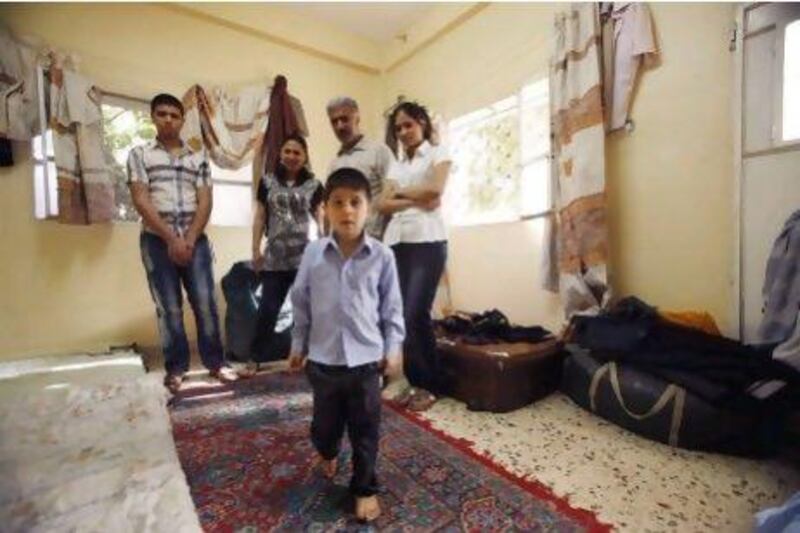The UN is helping many thousands of families who sought refuge in Jordan - but much depends on which country they fled from. Hugh Naylor and Suha Philip Ma'ayeh report
AMMAN // When they fled Iraq six months ago, the least of the Aziz family's concerns was competing for humanitarian aid in their Jordanian refuge.
Militants had stormed Jalal Aziz's home in Baghdad, beat him in front of his wife and shot his teenage son in the arm. They received death threats because they are Sabians, a religious group regularly targeted by Islamist radicals, and escaped with little more than the clothes on their back.
Now safe in a rundown flat in the Jordanian capital's east side, the family, and other Iraqi refugees, face a different challenge - vying for limited food aid and cash handouts with tens of thousands of Syrians.
"Just like we hurt, the Syrians are hurting too," said Mr Aziz, 48, a father of three. "But we fear that because we are Iraqi we are not the priority any more."
That concern stems from what Jordan's government says are more than 100,000 Syrians who have come seeking refuge from the Assad regime's deadly 14-month repression of a pro-reform uprising.
They have congregated in towns along Jordan's border with Syria and, increasingly, in the areas of Amman home to many of the estimated 100,000 Iraqi refugees still in Jordan.
Five years ago, at the height of fighting in Iraq, Jordan drew international attention for taking in as many as half a million Iraqis, but many have since either returned to Iraq or resettled in the United States and other western nations.
Now, given the global spotlight on Syria and its looming refugee crisis, Iraqi refugees still in Jordan are concerned their issues could be pushed to the back burner.
Some aid groups in Jordan say this is already happening.
The Umniaty Charity Association, whose 22 volunteers distribute packages of rice, beans, toiletries and toys to 4,000 Syrian and 3,000 Iraqi refugee families, has been instructed by local and international donors to change the focus of its efforts.
In the past several months, the aid delivered on behalf of the informal aid networks of church groups, Islamic charities and wealthy private donors has entirely shifted to the Syrians.
"At this stage, we aren't delivering food to Iraqis," said Sameeh Muraeb, the association's president. "We simply can't help them any more. We apologise, but what can we do? These are the constraints placed on us by donors."
This has placed pressure on his organisation from Iraqis who increasingly ask why they no longer receive assistance. The organisation's pleas for more help for Iraqis from donors and politicians in Iraq have largely gone unanswered.
Compounding this, Mr Muraeb said, is a decision by the United Nations High Commissioner for Refugees (UNHCR) to stop paying monthly aid stipends to scores of Iraqi families.
"They're already banned from working," he said. "All they have to live off is these stipends. This just worsens their tragedy."
UNHCR's representative in Jordan, Andrew Harper, confirmed that about 1,000 Iraqi refugees had been cut off from receiving stipends over the last year.
He said many of the 30,000 Iraqis in Jordan who are registered with UNHCR still face difficult circumstances, but the organisation began prioritising its Iraqi-refugee budget of US$40 million (Dh146m) to target the most needy. The cutbacks were also intended to encourage some aid recipients to either seek asylum abroad or return to Iraq, he said.
UNCHR stipends provide anywhere from tens to hundreds of dollars a month to refugees and their families, but rumours abound about some Iraqis abusing them. "The other day someone called it a salary," Mr Harper said. "That gives the impression of entitlement."
UNHCR is prohibited by donors from using funds from its Iraqi aid budget to bolster the US$8 million programme its 13,000 registered Syrians, but some of those who have been cut off from their UNCHR stipend suspect that is where their aid is going.
Among them is Yousuf Abdu, 18, who fled death threats against his family by militants in Mosul. He came to Amman with his older brother's wife and infant son in 2010.
They have been offered asylum in the United States, but hope to be able to move to Australia, as have many of their family.
"We don't know anyone in America. We just want to be with our family," he said. The family is running out of money to pay their JD120 (Dh621) monthly rent since their UN stipend was cut last month. The UN gave no explanation for the change.
"We're down to eating bread and tomatoes now," Mr Abdu said. "We need help, too, just like the Syrians."
The Aziz family too hope there will be enough help to share between Syrians and fellow Iraqis. They have registered with UNHCR but have not begun receiving aid.
In the meantime, they rely on the goodwill of neighbours such as a nearby market that gives them free fruit and canned tuna.
"Iraqis," Mr Aziz said, "are still suffering."
hnaylor@thenational.ae
Follow
The National
on
[ @TheNationalUAE ]
& Hugh Naylor on
[ @HughNaylor ]





